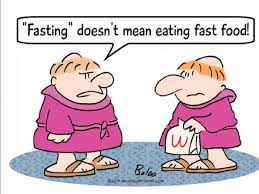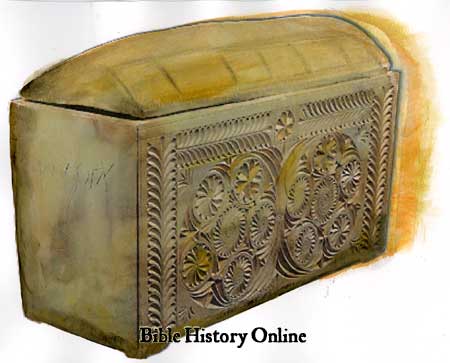|
Online links to scriptures (New International Version [NIV] unless otherwise stated) are shown in blue
| Prayer
5 “And when you pray, do not be like the hypocrites, for they love to pray standing in the synagogues and on the street corners to be seen by men. I tell you the truth, they have received their reward in full. |
|
|
| 6 But when you pray, go into your room, close the door and pray to your Father, who is unseen. Then your Father, who sees what is done in secret, will reward you. |
|
|
| 8 Do not be like them, for your Father knows what you need before you ask him. (Matthew 6:5-8) |
|
|
| EXPOSITION: |
|
 Note, Those who would not do as the hypocrites do in their ways and actions must not be as the hypocrites are in their frame and temper. He names nobody, but it appears by ch. 23:13, that by the hypocrites here he means especially the scribes and Pharisees. Now there were two great faults they were guilty of in prayer, against each of which we are here cautioned—vain-glory (v. 5, 6); and vain repetitions, v. 7, 8. Note, Those who would not do as the hypocrites do in their ways and actions must not be as the hypocrites are in their frame and temper. He names nobody, but it appears by ch. 23:13, that by the hypocrites here he means especially the scribes and Pharisees. Now there were two great faults they were guilty of in prayer, against each of which we are here cautioned—vain-glory (v. 5, 6); and vain repetitions, v. 7, 8.
Henry, Matthew, Matthew Henry’s Commentary on the Bible, (Peabody, MA: Hendrickson Publishers) 1997.
|
| TESTIMONY: |
|
 This is such a huge subject on the one hand, yet so simple on the other! This is such a huge subject on the one hand, yet so simple on the other!
Breakdowns in communication, both between people and between people and God, are at the heart of most of the problems of our daily lives, between nations, and between the church and God. The heart of the problem is that we look at life through the coloured spectacles of motivation and prejudice, hearing what we want to hear and saying what our life experience programmes us to say. In our humanness, being basically self-centred, most of us tend to speak (or think) somewhat more easily and often than we listen.
In our relationship with God, our humanness tends to come out even more, as God is physically unseen, yet has power over the universe. We so easily feel we can ignore His desires for us while giving Him a shopping list of how He can make our lives more comfortable! Sorry to be so straightforward, maybe even outrageous, but it applies to me as much as anyone else! How often do we regard our God as a great Father Christmas in the sky?
|
|
|
 Of course, we give God thanks, may praise and worship Him too, and pray for others. All very worthy and good. But seldom do we simply sit in the solitude of internal quietness and let Him speak His heart out to us and for us. We want to hear His word for us through the prophet, yet do not wait upon Him to talk to us directly. Yet good two way communication is at the heart of every successful relationship, in both the natural and the spiritual. Of course, we give God thanks, may praise and worship Him too, and pray for others. All very worthy and good. But seldom do we simply sit in the solitude of internal quietness and let Him speak His heart out to us and for us. We want to hear His word for us through the prophet, yet do not wait upon Him to talk to us directly. Yet good two way communication is at the heart of every successful relationship, in both the natural and the spiritual.
Over the years, as I have grown a little in God, I have come to realise and appreciate that it is not all about me, but progressively developed through Him and me to finally, all about Him. I try now to seek, sometimes more successfully than others, His will for me, rather than mine for Him! This doesn't happen all the time, for at times I am closer to Him than at others, or He might choose to test me for a season by letting me be seemingly alone for a time.
The 'vain glory' and 'vain repetition' that Matthew Henry mentions above, are classic examples of communication breakdown. We easily try to impress others, rather than speaking to the intended recipient, or repeat others' words because we don't know what to say ourselves.
The ideal for me, which I have not yet achieved, is to have an open conduit to God 24/7, so we can talk to each other on an ongoing basis. A spiritual cellphone! 'Txts' to God!
|
|
|
 Prayer meetings are good to bring people together and to petition God on behalf of a group, but the essence of prayer is personal communication with our Lord, away from the public eye, on a one to one basis. And most importantly, is then doing what He tells to do. Prayer meetings are good to bring people together and to petition God on behalf of a group, but the essence of prayer is personal communication with our Lord, away from the public eye, on a one to one basis. And most importantly, is then doing what He tells to do.
I am far from perfect. My prayer life, my cellphone with God, sometimes runs out of battery (of spiritual charge) or I wander outside the reception area (of desire or sin)!
I guess both you and I are 'works in progress'. May we be open to His leading and guiding in our lives, through prayer, today.
May we too, be like Jesus at Gethsemane, who was obedient even to a death, a death more horrible than anyone else has ever experienced.
Matthew 26:39
|
|
|
Now for the second part of Jesus' instruction on prayer.
|
| 9 “This, then, is how you should pray: â€â€˜Our Father in heaven, hallowed be your name, 10 your kingdom come, your will be done on earth as it is in heaven. 11 Give us today our daily bread. 12 Forgive us our debts, as we also have forgiven our debtor |
|
|
| 13 And lead us not into temptation, but deliver us from the evil one.’ (ADDED FROM KJV 13b. For thine is the kingdom, and the power, and the glory, for ever. Amen.) |
|
|
| 14 For if you forgive men when they sin against you, your heavenly Father will also forgive you. 15 But if you do not forgive men their sins, your Father will not forgive your sins. (Matthew 6:9-15) |
|
|
| EXPOSITION: |
|
 There are 3 parts to what we know as the Lord's Prayer (More accurately the 'Disciples Prayer'.) There are 3 parts to what we know as the Lord's Prayer (More accurately the 'Disciples Prayer'.)
1. THE PREFACE - stating whom we are addressing our prayer to.
2. THE PETITIONS - of which there are 6, the first 3 relating to God and the last 3 to our own concerns.
3. THE CONCLUSION - in which all glory is given to God.
|
| TESTIMONY: |
|
 It is impossible to discuss the multitudinous aspects and depth of this amazing 'model' prayer here. It is impossible to discuss the multitudinous aspects and depth of this amazing 'model' prayer here.
Sadly, over the years, through many repetitive, rote utterances, the 'sacredness' and depth of meaning of this prayer has been largely lost, until (particularly in charismatic and pentecostal churches) it has become largely ignored in worship services.
Yet there is a new revelation of its meaning coming to a wider and wider group of people who are starting to understand that this prayer is talking not about the future, but the establishment of God's kingdom upon earth in the here and now.
If the petitions of this prayer were fully reflected in our behaviour God's kingdom would come upon the earth! For the coming of His kingdom (your kingdom come, your will be done on earth as it is in heaven) is dependant upon our complete devotion to Him and full submission to His will. If we truly lived the lifestyle of the remaining petitions, 11 Give us today our daily bread. 12 Forgive us our debts, as we also have forgiven our debtors. 13 And lead us not into temptation, but deliver us from the evil one.’ we really would be kingdom people. Not forgetting of course, the 'conditional key' contained in the final verse. 15 But if you do not forgive men their sins, your Father will not forgive your sins. Oh dear!
Yes, you may accuse me of being idealistic! And I fully concede that I don't live up to this prayer all the time. And I cannot in my own power. But there is a new day dawning, one when the Holy Spirit is now being poured out upon the earth in greater measure, but in a different way, than we have experienced in the past - in the lives of
kingdom believers.
Joel 2:28-30
|
|
|
 At this time, through the power of the Holy Spirit, those who choose to make the sacrifice are heralding the return of Jesus gradually becoming the pure, perfect bride whom Jesus is coming to marry. At this time, through the power of the Holy Spirit, those who choose to make the sacrifice are heralding the return of Jesus gradually becoming the pure, perfect bride whom Jesus is coming to marry.
Revelation 19:7-8
|
|
|
Impossible? Not according to God's Word. What will you, what will I, choose to believe - and obey?
|
| <i>NEXT WEEK:</i> SERMON ON THE MOUNT continues... |
|
 ..... with a look both at fasting and building up treasure in heaven. ..... with a look both at fasting and building up treasure in heaven.
|
| A NOTE FROM DAVID |
|
 Most of us need to change our prayer habits, me included! Most of us need to change our prayer habits, me included!
We have to learn to listen as well as to speak.
Then we may well be able to hear and understand more of what God wants to tell us. That is surely what we all desire.
BIBLICAL ARCHAEOLOGY
OSSUARY OF CAIAPHAS
Did this ossuary contain the bones of Caiaphas, high priest during the time of Jesus?
This beautifully decorated ossuary found in the ruins of Jerusalem, contained the bones of Caiaphas, the first century AD. high priest during the time of Jesus.
On the side (as seen above) and the back of the ossuary is inscribed Caiaphas' name ("Yosef bar Caifa"). (see Matt 26:3, 57; Luke 3:2; John 11:49; 18:13-14, 24, 28; Acts 4:6; Josephus, Ant. 23.25, 39). It was a custom in ancient Israel to store the bones of the dead in ossuaries. They gathered the bones about a year after burial.
Caiaphas, who’s name means "searcher" was appointed high priest (after Simon ben Camith) by the procurator Valerius Gratus, under Tiberius, 18 A.D.. He continued in office from A.D. 26 to 37, when the proconsul Vitellius deposed him. He was the president of the Jewish council (Sanhedrim) which condemned the Lord Jesus to death, Caiaphas declaring Him guilty of blasphemy.
Caiaphas was the official high priest during the ministry and trial of Jesus (Matt 26:3, 57; Luke 3:2; John 11:49; 18:13, 14, 24, 28; Acts 4:6).
Source: http://www.bible-history.com
|
So until next week.......
MAY GOD BLESS YOU AND YOU BLESS GOD!
His servant and yours

Learn more about us at...
www.wwj.org.nz/about.php
|
A DAVID'S DOODLING
966. In prayer, silence often speaks louder than words.
David Tait
|
Check
out the WWJ website for….
More David's Doodlings: www.wwj.org.nz/dd.php
Links to other sites of interest: http://www.wwj.org.nz/links.php
Till Death do us Part!: http://www.wwj.org.nz/tddup.php
Pets Rule!: http://www.wwj.org.nz/pets.php
The World's Greatest Groans: http://www.wwj.org.nz/groans.php
|

 Note, Those who would not do as the hypocrites do in their ways and actions must not be as the hypocrites are in their frame and temper. He names nobody, but it appears by ch. 23:13, that by the hypocrites here he means especially the scribes and Pharisees. Now there were two great faults they were guilty of in prayer, against each of which we are here cautioned—vain-glory (v. 5, 6); and vain repetitions, v. 7, 8.
Note, Those who would not do as the hypocrites do in their ways and actions must not be as the hypocrites are in their frame and temper. He names nobody, but it appears by ch. 23:13, that by the hypocrites here he means especially the scribes and Pharisees. Now there were two great faults they were guilty of in prayer, against each of which we are here cautioned—vain-glory (v. 5, 6); and vain repetitions, v. 7, 8. This is such a huge subject on the one hand, yet so simple on the other!
This is such a huge subject on the one hand, yet so simple on the other! Of course, we give God thanks, may praise and worship Him too, and pray for others. All very worthy and good. But seldom do we simply sit in the solitude of internal quietness and let Him speak His heart out to us and for us. We want to hear His word for us through the prophet, yet do not wait upon Him to talk to us directly. Yet good two way communication is at the heart of every successful relationship, in both the natural and the spiritual.
Of course, we give God thanks, may praise and worship Him too, and pray for others. All very worthy and good. But seldom do we simply sit in the solitude of internal quietness and let Him speak His heart out to us and for us. We want to hear His word for us through the prophet, yet do not wait upon Him to talk to us directly. Yet good two way communication is at the heart of every successful relationship, in both the natural and the spiritual. Prayer meetings are good to bring people together and to petition God on behalf of a group, but the essence of prayer is personal communication with our Lord, away from the public eye, on a one to one basis. And most importantly, is then doing what He tells to do.
Prayer meetings are good to bring people together and to petition God on behalf of a group, but the essence of prayer is personal communication with our Lord, away from the public eye, on a one to one basis. And most importantly, is then doing what He tells to do. There are 3 parts to what we know as the Lord's Prayer (More accurately the 'Disciples Prayer'.)
There are 3 parts to what we know as the Lord's Prayer (More accurately the 'Disciples Prayer'.) It is impossible to discuss the multitudinous aspects and depth of this amazing 'model' prayer here.
It is impossible to discuss the multitudinous aspects and depth of this amazing 'model' prayer here.  At this time, through the power of the Holy Spirit, those who choose to make the sacrifice are heralding the return of Jesus gradually becoming the pure, perfect bride whom Jesus is coming to marry.
At this time, through the power of the Holy Spirit, those who choose to make the sacrifice are heralding the return of Jesus gradually becoming the pure, perfect bride whom Jesus is coming to marry.  ..... with a look both at fasting and building up treasure in heaven.
..... with a look both at fasting and building up treasure in heaven.  Most of us need to change our prayer habits, me included!
Most of us need to change our prayer habits, me included!